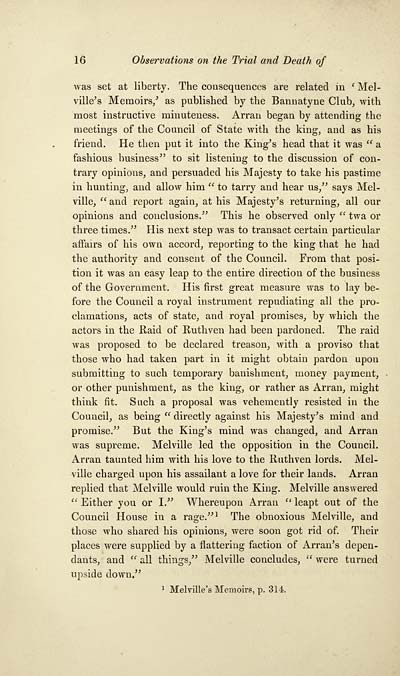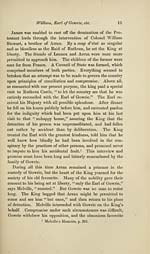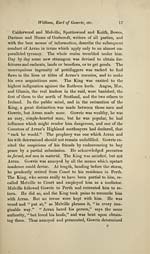Papers relating to William, first Earl of Gowrie, and Patrick Ruthven, his fifth and last surviving son
(32) Page 16
Download files
Complete book:
Individual page:
Thumbnail gallery: Grid view | List view

16 Observations on the Trial and Death of
was set at liberty. The consequences are related in c Mel-
ville's Memoirs/ as published by the Bannatyne Club, with
most instructive minuteness. Arran began by attending the
meetings of the Council of State with the king, and as his
friend. He then put it into the King's head that it was " a
fashious business" to sit listening to the discussion of con-
trary opinions, and persuaded his Majesty to take his pastime
in hunting, and allow him " to tarry and hear us," says Mel-
ville, " and report again, at his Majesty's returning, all our
opinions and conclusions." This he observed only " twa or
three times." His next step was to transact certain particular
affairs of his own accord, reporting to the king that he had
the authority and consent of the Council. From that posi-
tion it was an easy leap to the entire direction of the business
of the Government. His first great measure was to lay be-
fore the Council a royal instrument repudiating all the pro-
clamations, acts of state, and royal promises, by which the
actors in the Raid of Ruthven had been pardoned. The raid
was proposed to be declared treason, with a proviso that
those who had taken part in it might obtain pardon upon
submitting to such temporary banishment, money payment,
or other punishment, as the king, or rather as Arran, might
think fit. Such a proposal was vehemently resisted in the
Council, as being " directly against his Majesty's mind and
promise." But the King's mind was changed, and Arran
was supreme. Melville led the opposition in the Council.
Arran taunted him with his love to the Ruthven lords. Mel-
ville charged upon his assailant a love for their lands. Arran
replied that Melville would ruin the King. Melville answered
" Either you or I." Whereupon Arran u leapt out of the
Council House in a rage." 1 The obnoxious Melville, and
those who shared his opinions, were soon got rid of. Their
places were supplied by a flattering faction of Arran's depen-
dants, and " all things," Melville concludes, " were turned
upside down."
1 Melville's Memoirs, p. 314.
was set at liberty. The consequences are related in c Mel-
ville's Memoirs/ as published by the Bannatyne Club, with
most instructive minuteness. Arran began by attending the
meetings of the Council of State with the king, and as his
friend. He then put it into the King's head that it was " a
fashious business" to sit listening to the discussion of con-
trary opinions, and persuaded his Majesty to take his pastime
in hunting, and allow him " to tarry and hear us," says Mel-
ville, " and report again, at his Majesty's returning, all our
opinions and conclusions." This he observed only " twa or
three times." His next step was to transact certain particular
affairs of his own accord, reporting to the king that he had
the authority and consent of the Council. From that posi-
tion it was an easy leap to the entire direction of the business
of the Government. His first great measure was to lay be-
fore the Council a royal instrument repudiating all the pro-
clamations, acts of state, and royal promises, by which the
actors in the Raid of Ruthven had been pardoned. The raid
was proposed to be declared treason, with a proviso that
those who had taken part in it might obtain pardon upon
submitting to such temporary banishment, money payment,
or other punishment, as the king, or rather as Arran, might
think fit. Such a proposal was vehemently resisted in the
Council, as being " directly against his Majesty's mind and
promise." But the King's mind was changed, and Arran
was supreme. Melville led the opposition in the Council.
Arran taunted him with his love to the Ruthven lords. Mel-
ville charged upon his assailant a love for their lands. Arran
replied that Melville would ruin the King. Melville answered
" Either you or I." Whereupon Arran u leapt out of the
Council House in a rage." 1 The obnoxious Melville, and
those who shared his opinions, were soon got rid of. Their
places were supplied by a flattering faction of Arran's depen-
dants, and " all things," Melville concludes, " were turned
upside down."
1 Melville's Memoirs, p. 314.
Set display mode to:
![]() Universal Viewer |
Universal Viewer | ![]() Mirador |
Large image | Transcription
Mirador |
Large image | Transcription
Images and transcriptions on this page, including medium image downloads, may be used under the Creative Commons Attribution 4.0 International Licence unless otherwise stated. ![]()
| Histories of Scottish families > Papers relating to William, first Earl of Gowrie, and Patrick Ruthven, his fifth and last surviving son > (32) Page 16 |
|---|
| Permanent URL | https://digital.nls.uk/94862102 |
|---|
| Description | A selection of almost 400 printed items relating to the history of Scottish families, mostly dating from the 19th and early 20th centuries. Includes memoirs, genealogies and clan histories, with a few produced by emigrant families. The earliest family history goes back to AD 916. |
|---|

